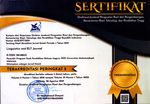THE EFFECTIVENESS OF VIRTUAL MICROTEACHING CLASS IN COVID-19 PANDEMIC TIME
Abstract
As a spread prevention of Covid-19 virus, schools must implement their learning process through online from Elementary School up to University including Jenderal Soedirman University. In the Covid-19 pandemic, English Education Department of Jenderal Soedirman University has already implemented Microteaching subject online or using E-Learning with the lecturer. This research uses a statistical calculation and interview data from 21 out of 31 respondents because some students have converted Microteaching credit in exchange of participation in Kampus Merdeka Program. There are 5 variables that influence Virtual Microteaching Class effectiveness. They are Enthusiasm, Learning Media, Learning Material, Task, and Lecturers’ Performance. However, the Enthusiasm variable (P=0.046) and Learning Media (P=0.020) are significant for the effectiveness of virtual Microteaching class. At the same time, other variables such as Learning Material (P=0.213), Task (P=0.166), and Lecturers’ Performance (P=0.166) are not significant for virtual Microteaching class. The effectiveness score of Virtual Microteaching Class for 6th semester students, English Education Department of Jenderal Soedirman University is 71% which means effective. The usage of Google Classroom for Virtual Microteaching Class has some disadvantages such as lack of video meeting features that most of the students need, and late notification caused by internet signal problems. As solutions to solve the problems of using Google Classroom for Virtual Microteaching class, lecturers need to explore the features of Google Classroom, and they are encouraged to use a better platform with a built-in virtual meeting and discussion features that can save large data and be downloaded at any time.
Keywords
Full Text:
PDFReferences
Asrul, N. A. M. (2020). Ekspektasi dan tingkat kepuasan mahasiswa terhadap kualitas layanan pendidikan secara daring selama pandemi COVID 19. Jurnal Administrasi Publik, 16(2), 111-122.
Otsupius, I. A. (2014). Micro-teaching: A technique for effective teaching. African Research Review, 8(4), 183-197.
Bawelle, C. F. N., Lintong, F., & Rumampuk, J. (2016). Hubungan penggunaan smartphone dengan fungsi penglihatan pada mahasiswa Fakultas Kedokteran Universitas Sam Ratulangi Manado angkatan 2016. Jurnal E-Biomedik, 4(2), 0-5. https://doi.org/10.35790/ebm.4.2.2016.14865.
Harandi, R. (2015). Effects of e-learning on Students’ Motivation. Procedia-Social and Behavioral Sciences, 181, 423-430. DOI:10.1016/j.sbspro.2015.04.905.
Kusmawan, U. (2017). Online Microteaching: A Multifaced Approach to Teacher Professional Development. Journal of Interactive Online Learning, 15 (1), 42-56.
Mulia, P. (2021). Persepsi Mahasiswa Terhadap Pembelajaran Daring Berbasis Google Classroom Pada Mata Kuliah Kajian Fisika Sekolah III. Jurnal Serambi Akademica, 9(7), 1101-1106.
Khikmah, N., Lovia, L. N., Zahro, F., & Azizah, F. N. (2021). Pemanfaatan Google Classroom dalam Praktik Microteaching Pembelajaran Fiqih MI bagi Mahasiswa PGMI UIN Walisongo Semarang. Jurnal Studi Guru Dan Pembelajaran, 4(1), 237-246. https://doi.org/10.30605/jsgp.4.1.2021.466.
Peraturan Pemerintah Nomor 19 tahun 2005 Tentang Standar Nasional Pendidikan.
Putra, K. A., Nulinnaja, R., & Munir, M. (2020). Persepsi Mahasiswa pada Pembelajaran Daring melalui Pemanfaatan Google Classroom dan Google Meet di UIN Maulana Malik Ibrahim Malang. Indonesian Journal of Islamic Education Studies (IJIES), 3(2), 252-265.
Saragih, O., Sebayang, F. A. A., Sinaga, A. B., & Ridlo, M. R. (2020). Persepsi mahasiswa terhadap pembelajaran daring selama pandemi COVID-19. Tarbiyah Wa Ta'lim: Jurnal Penelitian Pendidikan dan Pembelajaran, 7(3), 178-191.
Setiawan, I., & Mulyati, S. (2018). Efektivitas Mata Kuliah Pembelajaran Mikro (Microteaching) Terhadap Keterampilan Dasar Mengajar Dan Kesiapan Mengajar. Equilibrium. Jurnal Penelitian Pendidikan dan Ekonomi, 15(2), 51- 60. DOI: 10.25134/equi.v15i02.
Sidabutar, L., Adhitya, T., Wong, F., Rici, M., & Wibisono, Y. (2019). Analisis Pengaruh Game Online Mobile Terhadap Kesehatan Mata Pada Mahasiswa FTI UAJY. SINTAK, 3. Retrieved from https://www.unisbank.ac.id/ojs/index.php/sintak/article/view/7633.
Yunus, M., Setiawan, D. F., & Wuryandini, E. (2021). Persepsi Mahasiswa terhadap Pembelajaran Online pada masa Pandemi COVID-19. Jesya (Jurnal Ekonomi dan Ekonomi Syariah), 4(2), 1196-1202.
DOI: https://doi.org/10.31764/leltj.v10i1.9307
Refbacks
- There are currently no refbacks.
Copyright (c) 2022 Linguistics and English Language Teaching Journal

This work is licensed under a Creative Commons Attribution-ShareAlike 4.0 International License.
_____________________________________________________
Linguistics and ELT Journal
p-ISSN 2339-2940 | e-ISSN 2614-8633

LELTJ is licensed under a Creative Commons Attribution-ShareAlike 4.0 International License.
_____________________________________________________
LELTJ is abstracting & indexing in the following databases:
_____________________________________________________
LELTJ Editorial Office:













